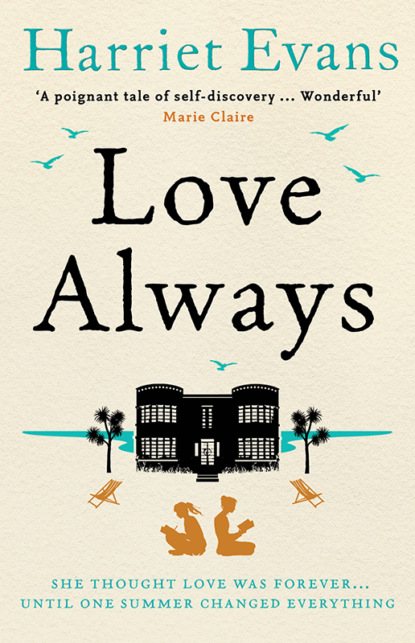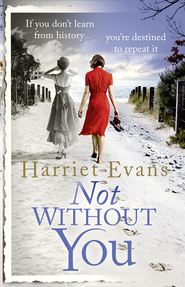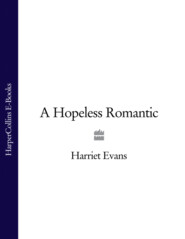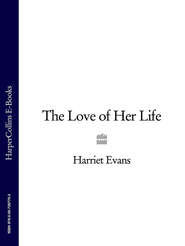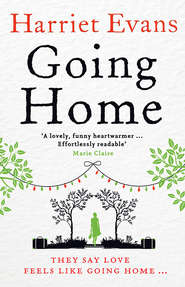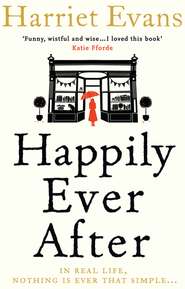По всем вопросам обращайтесь на: info@litportal.ru
(©) 2003-2024.
✖
Love Always: A sweeping summer read full of dark family secrets from the Sunday Times bestselling author
Автор
Год написания книги
2018
Настройки чтения
Размер шрифта
Высота строк
Поля
‘That’s such crap – how the hell do you know that’s what happened?’ I sit up, full of righteous anger. ‘How do they know? Why hasn’t anyone ever said anything to me about it before? Why hasn’t Mum ever said—’
‘She’s not going to, is she?’ Octavia says, genuinely pitying. ‘But your mother – oh, I don’t know what was going on that summer,’ she says. She scratches her forehead. ‘I don’t think Mum knows, even. Just – all I’m saying is, your mother wouldn’t tell anyone what the row was about, and there’s no way of finding out, is there?’
‘No,’ I say, and I think of the diary again, and then remember how thin the outline of it feels between my fingers, how childish. But I don’t touch it again. I don’t want Octavia suspecting anything. I look at her, and think how strange it is that I know her really well, and yet I don’t know her at all. Never been to her house, don’t know any of her friends, or about her romantic life, or her favourite books to read or anything. She’s just always been there. I thought we were family, and it turns out I don’t know her at all either.
She’s right. I’ve been living in a dreamworld. ‘Look,’ she says, as though she’s regretting speaking so hastily. ‘I hope – I’m sorry, perhaps I shouldn’t have said anything.’ She clears her throat. ‘But you had to know. I can’t believe you’ve never heard an inkling of it before.’
There’s a lot I could say to this, but I don’t. I raise my hand. ‘It’s OK. Look, let’s just not talk about it any more.’
We slide into an awkward silence for the rest of the journey, but I’m glad. I don’t know what on earth we’d talk about.
Chapter Eleven
The sleeper train from Penzance has a special platform to itself, outside the main station. I like that; it accords it a proper position. In summer, it can be a trying experience. It is always crowded, frequently extremely hot (the air conditioning is temperamental), and it gets light so early that, as a child, I would wake at three-thirty and never be able to get back to sleep, lying there on the top bunk under the scratchy blue blankets, tossed about by the motion of the train.
Mum would come down again at the end of the summer to take me back to London, unless Granny was coming up herself, and I always hated it when Mum arrived because I hated leaving Summercove. It was like leaving a fairytale palace behind, a warm, airy, sweet-smelling palace where I was free, where my grandmother was always there so I never got lonely, and where the sun shone and Jay and I were together. Back in London we knew September would be racing to catch us, damp-drenched mornings when the sun rose later and colder, and winter lay just around the corner, putting me and especially my mother into a funk that would last till spring.
On the train back I would always go over the holiday in my head, committing it all to memory. The walk to Logan’s Rock, and the terrifying winds that threaten to blow you off to the treacherous waters beneath. Sitting outside at the Minack Theatre, an amphitheatre carved into the cliffs, screaming with laughter at A Midsummer Night’s Dream. Jay and I clambering down through the rocks to the beach below the house; the astonishing green and blue of the water, the ginger beer that was sharp and sweet, at the same time, on your tongue. The warmth, the wet, the wildness, the knowledge that being in Cornwall is like being in a different country, and that every mile you draw away from it is like leaving a part of you behind. Yes, I thought it was like something out of a fairytale.
After we’ve paid Mike and waved him off, Octavia and I stand on the blustery quayside, at the entrance to the station.
‘Do you know what carriage you are?’ I ask, my tone almost formal.
She shakes her head. ‘I have to go and pick my tickets up from the machine.’
‘Oh,’ I say. ‘Right.’
We are silent. I look down at my black boots. I pulled them on this morning, at five-thirty, in the dark. It seems like a lifetime ago.
‘So, I’ve already got my ticket,’ I say, waving the orange card at her. ‘I think I’ll—’
‘Yes, yes,’ she says, a touch too eagerly. ‘Well, it was . . .’ she trails off. ‘Er, good to see you.’
Someone hurries past us, dragging a suitcase on wheels. It crackles loudly over the tarmac. ‘Look, Natasha,’ Octavia says, after another silence. ‘I’m sorry. Perhaps I shouldn’t have said it like that.’ She holds her hands up. Don’t blame me. ‘I just thought you’d have heard. You know, everyone’s always . . .’ She trails off again, and crosses her arms defensively. ‘It’s all water under the bridge, I suppose.’
‘It’s clearly not though, is it?’ I say. ‘It’s anything but that. It explains a lot, anyway.’ I’m trying not to sound angry. ‘Look, your mum’s always had it in for my mum and I’ve never known why, and now I do. That’s why I’m not surprised.’
‘You understand why now.’ Octavia nods, as if to say, Good. She’s finally getting it.
‘No, I don’t believe it, Octavia. What I mean is,’ I say, breathing deeply, ‘I understand why you’ve always been so vile to us now. I mean, did your mother tell you this herself?’
‘Not in so many words,’ Octavia says. ‘You don’t sit down and explain something like that – we just always knew. Dad, too. And Uncle Jeremy. That’s why he never comes back.’ She shrugs.
‘Well, as you like. I don’t believe for a second, a second –’ and I raise my voice so I’m speaking as loudly as possible without shouting, and I can hear myself, high above the clinking masts in the harbour, above the train engine – ‘that my mother killed Cecily, or anyone. I don’t know what happened, but I know that much.’ I sling my bag over my shoulder.
‘Hey –’ she begins. ‘That’s just what they say. I’m just saying—’
‘No,’ I interrupt. ‘Let’s not go into it again, OK? I think I’m going to get on, now. See you around then. Thanks for—‘ I don’t know what to thank her for, but since I’ve started I think I’d better finish. ‘Er – thanks for sharing the taxi fare with me.’
Octavia nods back – what else can she do? – and says, ‘No problem.’
I don’t look back at her as I walk towards the train. I pray I don’t bump into her again, but I’m pretty sure she’ll steer clear of me this time. She thinks she’s done me a favour. That’s what upsets me most of all. Pointed out how stupid I’ve been.
In the summer the buffet car is always full; people arrive as early as possible to get a seat so they’re not shut into their cabins, which are initially cute but soon become claustrophobic. In winter, the car is nearly empty, and after I have dumped my bag in the single-bed cabin and admired the free set of toiletries, I settle down into one of the single seats by the window, with a table and a lamp, and put my bag in front of me. I look around hastily again, but Octavia hasn’t appeared. The diary pages are still in my pocket. I sit there, and the train pulls slowly away from the station, and I don’t know what to feel.
There’s a Times on the opposite seat – the guard obviously missed it – and I pick it up. I order some tea and biscuits, even though I’m not hungry, and I start reading the paper. The news absorbs me. I read about a cabinet plot to oust the Prime Minister, the flooding all over the country, the travails of a minor sportsman and his ‘celebrity’ wife, what’s happening in a reality TV show, which MP has tried to claim an antique rug on expenses. I feel as if I’ve been away for a long time, and I am gathering information to piece myself back together, bit by bit.
I know before I turn the page to the Obituaries section that I will see a photo of my grandmother, scarf in her hair, a broad smile curling over her perfect teeth, brush in hand, a mug of tea and painting paraphernalia – palette, brushes, rags, turps – cluttered around her, in the studio I was standing in over an hour ago. It looks completely different, crammed with canvases, postcards stuck on the walls, pot plants, a gramophone.
Something catches in my throat. She is smiling out at me. It’s like Cecily’s face, shining out of the drawer.
Frances Seymour
Highly acclaimed observer of Cornish landscape who never painted after 1963
Frances Seymour, who has died at the age of eighty-nine, was what one would call a star. Not for her the flamboyance, the tantrums and temperamentality, clichés of the artist: she was universally beloved, charismatic and beautiful, a magnet for men and women alike; her house, the beautiful Summercove near Treen in Cornwall, open to all and a haven for friends and family. She lit up every room she was in and her company was a rare gift.
Because of her charm and force of personality it is easy to forget, therefore, the gap Seymour created when she abandoned painting after the death of her youngest daughter Cecily, in a tragic accident. Frances never forgave herself for her daughter’s death, and some have speculated this was her form of penance, for the events of that summer in 1963. This is not established. What it is important to establish, however, is the role Frances Seymour played before that in sealing the reputation of British painting in the mid-twentieth century.
Frances Seymour was not a Cornish painter, or a female painter. She was simply one of the most talented artists of the last century.
This was my grandmother, I want to shout. I want to wave the paper out of the window, like the Kind Old Gentleman in The Railway Children. Look how clever she was, how brilliant!
Tears come to my eyes, and I’m crying, I can’t help it. I don’t understand anything any more. I keep hearing Octavia’s voice, and when I close my eyes I can see her large grey eyes, her pointy noise, looming at me in the dark, as she oh-so-carefully stabs my mother in the back, over and over again. I want to hate her, to laugh at her, but I can’t. I ask myself why I can’t.
Because, despite what I said to her only an hour before, I’m terrified that she’s right.
I look out of the window, as if I expect to see someone’s face there. We have been going fast, through a blur of nondescript-looking villages, but suddenly it is dark, a landscape with no lights at all. I can see my own reflection in the window, nothing more. My neck and the newspaper are both startlingly white against the blackness outside, the blackness of my coat and dress. I stare at myself; I can’t see the tears; I look like a ghost. In the black and white of the light, I look like Cecily.
Carefully, I tear the obituary out of the paper and fold it. The tearing sound is loud, and the couple at the table next to me look up, curiously. I stand up and smile, backing away towards my room and when I get there, I fall onto the familiar old scratchy blue blanket and the smooth white sheets. I take the pages out of my pocket and sit on the lower bunk, holding them in my hand, gazing at them, at the scrawling black handwriting, my finger and thumb poised to turn the first page. I close my eyes.
And now I can see myself, suddenly, back at Summercove. There are voices I recognise, but they’re different somehow, thinner, higher. Bright sunshine is streaming into the living room, the smell of sea and grass and something else, something dangerous, almost tangible, rushing towards me . . . And Cecily’s face, as it was in the oil sketch. Come with me! Come with me, she is saying. And I do. I take a deep breath and I follow her, down to the sea.
The Diary of Cecily Kapoor, aged fifteen. July, 1963.
St Katherine’s School for Girls
Denmouth
Devon
England
If lost please return
Saturday, 20th July 1963
Dear Diary,





